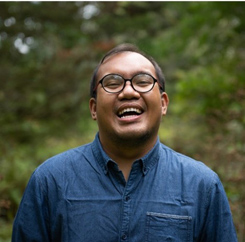| People |
| Elson Ian Nyl Ebreo Galang, Ph.D. (Co-supervised by Prof. Elena Bennett) BSc Agriculture in Landscape Agroforestry, University of the Philippines at Los Baños (2016), Laguna, Philippines; MSc Sustainability, United Nations University Institute for the Advanced Study of Sustainability (2019), Tokyo, Japan; Ph.D. Renewable Resources, McGill University (2025), Canada. Email: elson.galang@mail.mcgill.ca Interests: participatory approaches; qualitative methods for sustainability science; social dimension of ecosystem services; process outcomes evaluation
|
|
Ph.D. Thesis:
PARTICIPATORY SCENARIO PLANNING FOR SOCIAL-ECOLOGICAL SYSTEMS AS A SOCIAL LEARNING PROCESS FOR SUSTAINABILITY AND RESILIENCE
Abstract
Participatory Scenario Planning (PSP) collaboratively engages societal actors to imagine alternative plausible futures. PSP is often cited as an effective social learning process that can positively influence how individuals think, relate, and feel about one another and about their ecosystems. However, limited evidence exists on the diversity, magnitude, and persistence of these potential social learning outcomes. Key gaps also persist in understanding the specific features of PSP that enable these outcomes. My thesis explores how PSP facilitates social learning.
After a brief introduction (Chapter 1), I present a literature review (Chapter 2) of relevant theories and concepts about PSP and social learning, followed by my conceptual framework about the key operational characteristics of PSP (i.e., participant composition, process design, and facilitation) that might make it effective for social learning and the multidimensionality of potential outcomes from PSP, including: (1) cognitive changes in knowledge among participating actors, (2) relational changes in relationships, (3) normative changes in preferences or goals, (4) changes to emotions, and (5) institutional outcomes.
I then present a scoping review of 45 PSP cases in the Biosphere Futures database (Chapter 3), a global repository of scenario planning examples. Of the five types of outcomes in my framework, cognitive outcomes were the most reported outcomes of these cases, while emotional outcomes were the least reported. I also found that outcomes may be associated with certain operational features of the PSP such as its spatial scale and the types of actors engaged.
In Chapter 4, I present the outcomes assessment of the PSP for the tidal wetland-dykeland system of the Bay of Fundy, Nova Scotia. Here, I designed and implemented innovative mixed methods approaches to show that the PSP I facilitated significantly broadened systems thinking (i.e., cognitive outcomes), improved rational trust (i.e., relational outcomes), and shifted environmental aspirations (i.e., normative outcomes) among participants (n=18), with all changes persisting for at least three months after the PSP. Ex-post interviews of participants underscored how PSP’s operational attributes, especially participant composition, can be critical for these outcomes.
In Chapter 5, I present an assessment of empathic emotions (i.e., emotional outcome) among participants of two PSPs. I modified and implemented an empathic concern index tool to demonstrate how these PSPs significantly positively affected participants’ empathic emotions for non-humans and future people in these ecosystems, which lasted at least three months after the PSPs. Neither PSP, however, affected the empathic emotions toward the current inhabitants. Overall, my thesis contributes to a more profound and systematic understanding of PSPs that can support social learning in social-ecological systems. I help establish that PSPs can meaningfully influence how people think about ecosystems, collaborate with each other, and consider nonhumans and future generations for a more sustainable and resilient future.
Awards and Scholarships:
NSERC ResNet Graduate Student Funding 2020-24.
Graduate Excellence Award, McGill University, 2020-23.
Tomlinson Centennial Fellowship in Forest Ecology, McGill University 2020-23.
Fonds de recherche du Québec – Société et culture, 2022-2026
Publications:
Galang, E.I.N, Bennett, E.M., Hickey, G.M., Baird, J., Dale, G. and Sherren, K. (2025). Co-imagining future scenarios can enhance environmental actors’ empathy towards future generations and non-human lifeforms. Sustainability Science 20: 511–524.
Galang, E.I.N, Bennett, E., Hickey, G.M., Baird, J., Harvey, B. and Sherren, K. (2025). Participatory Scenario Planning: A social learning approach to build systems thinking and trust for sustainable environmental governance. Environmental Science and Policy 164: 103997.
For publications before this Ph.D., please check my ResearchGate or GoogleScholar profiles.
| <<Back |
